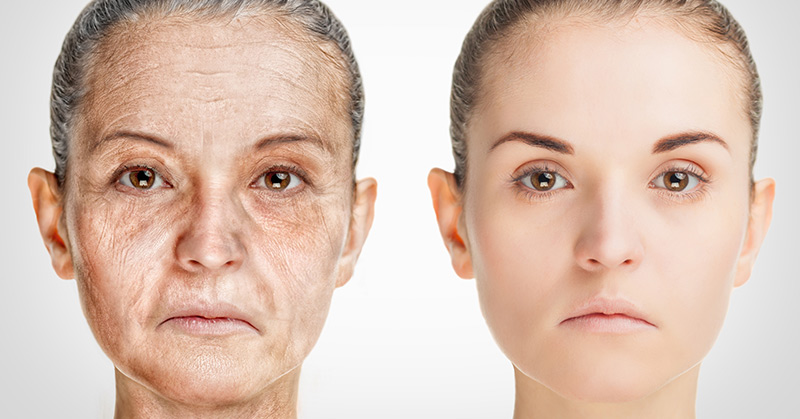Most of us recognize the signs of aging in ourselves. Maybe you start noticing some grey hairs, or experience a little bit of weight gain, or start getting a few aches and pains here and there.
Scientists have recently found out that they can tell you’re aging too… by analyzing your blood plasma [1].
The Study
The study, published in the journal Nature Medicine, explains how researchers have found a way to use the protein levels in people’s blood to accurately predict a person’s age [2].
The team analyzed the blood plasma of 4 263 people ranging in age from 18 to 95 and tested the levels of approximately 3000 different proteins. 1379 of these proteins were found to change with age [2].
Interestingly enough, they found that aging isn’t one long, continuous process the way we thought. According to their research, the body seems to undergo three major shifts at 34, 60, and 78 years old [2].
“By deep mining the aging plasma proteome, we identified undulating changes during the human lifespan,” write the researchers.
“These changes were the result of clusters of proteins moving in distinct patterns, culminating in the emergence of three waves of aging.” [1]
This is not the first time scientists have studied the connection between blood and aging. In 2014, researchers at Stanford University found that giving older mice infusions of blood from younger mice helped to prevent and even reverse cognitive decline due to aging [5].
Older mice who were given younger blood showed improvements in both memory and learning. Conversely, younger mice who were given “old blood” showed a decline in cognitive health [5].
How Do These Findings Benefit Us?
Researchers know that aging is a significant risk factor for disease and death [3]. Although populations around the world are rapidly aging, it seems that this is not being accompanied by good health [4].
If we can slow down the aging process, we can increase a person’s “functional lifespan”, or “healthspan”, meaning they can have a better quality of life for a longer period of time [3].
“We’ve known for a long time that measuring certain proteins in the blood can give you information about a person’s health status – lipoproteins for cardiovascular health, for example,” says neurologist Tony Wyss-Coray, from the Stanford Alzheimer’s Disease Research Center (ADRC) [1].
Levels of these age-related proteins appear to remain relatively constant, with big shifts happening at age 34, 60, and 78 [1].
Although researchers don’t fully understand why this happens, they believe that it could lead to better healthcare in the future. For example, if doctors can trace these proteins back to their sources, they could warn you that an important organ, such as your liver, is aging faster than the average person’s [1].
These findings also might help us better understand how our bodies break down as we get older, and how we might better approach treatment for age-related diseases like Alzheimer’s and cardiovascular disease [1].
6 Ways You Can Slow Down the Ageing Process Right Now
These findings are still very new, and any clinical applications may be five to ten years away, but there are still many steps you can take to help slow your own aging process down:
- Avoid destructive habits. Specifically smoking. Not only will this increase your chances of living a longer, healthier life, but it will help you look younger, too. Nicotine narrows the blood vessels in the outermost layers of your skin, which impairs blood flow to your skin. Less blood flow means fewer nutrients, which makes your skin wrinkle much faster [6].
- Drink in moderation. Alcohol dehydrates you and dries out your skin. Heavy consumption can weaken vital organs such as your liver and kidneys, and over time it can actually shrink brain cells, and weaken your immune system [7].
- Sleep. When you sleep, you give your body a chance to repair cells and rest your heart [8]. It is also the time when you clear waste from your brain, and support learning and memory [9].
- Change up your fat intake. Omega-3 fats help keep free-radicals from damaging your cells, so consider cutting down on saturated fats and replacing them with Omega-3’s [8].
- Eat your greens. This should come as no surprise – fruits and vegetables are high in antioxidants that protect your cells. This has a positive impact on your skin, your heart, your bones, your brain, and pretty much everywhere else in your body [10].
- Exercise Regularly. Regular physical activity preserves your immune system. This will help you to be more resistant to disease as you get older and improve your quality of life [11].
Although you may not be able to find out just yet how quickly you’re aging on the cellular level, if you take good care of yourself you can stay young physically and mentally, and maintain your quality of life well into old age.
- https://www.sciencealert.com/our-bodies-age-in-three-separate-shifts-according-new-blood-tests
- https://www.nature.com/articles/s41591-019-0673-2
- https://www.pnas.org/content/88/12/5360
- https://www.sciencedirect.com/science/article/pii/S0140673615005164
- https://med.stanford.edu/news/all-news/2014/05/infusion-of-young-blood-recharges-brains-of-old-mice-study-finds.html
- https://www.mayoclinic.org/healthy-lifestyle/quit-smoking/expert-answers/smoking/faq-20058153
- https://www.webmd.com/mental-health/addiction/ss/slideshow-alcohol-aging
- https://www.webmd.com/healthy-aging/features/promote-the-aging-process#2
- https://www.scientificamerican.com/article/what-happens-in-the-brain-during-sleep1/
- https://www.aad.org/skin-care-secrets/reduce-premature-aging-skin
- https://link.springer.com/article/10.1007/BF03340127

